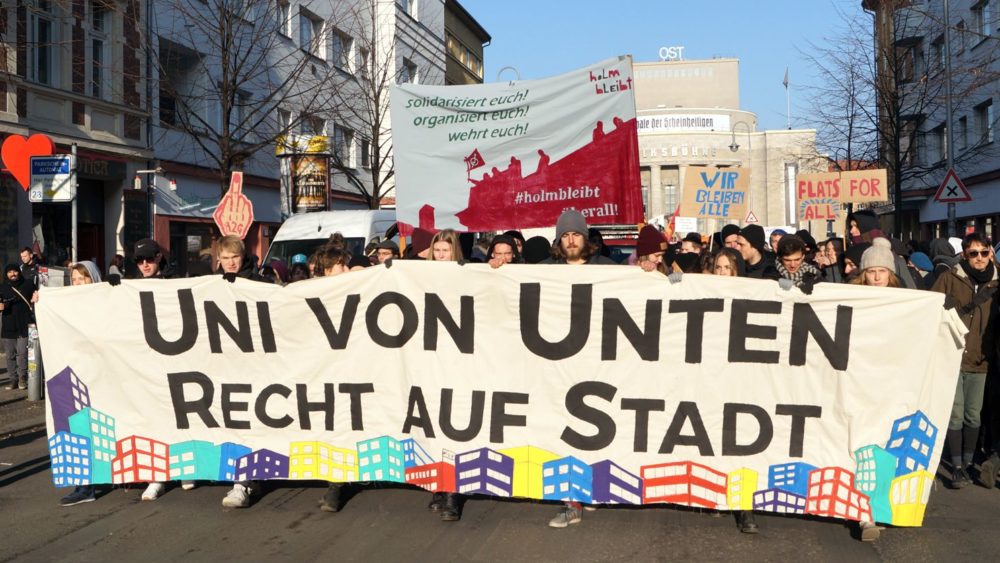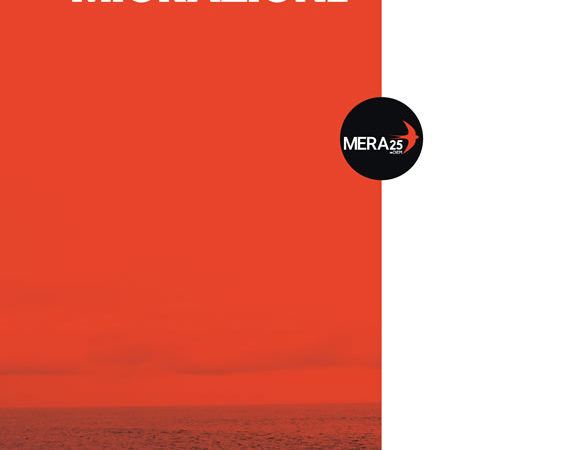In Berlin a broad alliance of local initiatives takes to the streets for social housing and self-determined organisation of the city by its inhabitants. Students of the Humboldt University of Berlin initiated this demonstration. What is exemplified by this demonstration is the consequence of extensive social change. A report.
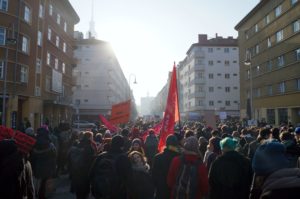
The students present at the demonstration on Saturday did not exhibit signs of fatigue. Although they would have had every reason to be tired. For ten days already they have occupied the Institute of Social Sciences of Humboldt University. The catalyst for the lasting occupation has been the dismissal of their lecturer for City Sociology, Andrej Holm. Holm, who additionally saw himself forced to step back from his office as State Housing Secretary for the Berlin government, a coalition of the social democratic party (SPD), the Green and Left Parties (Die Grünen, Die Linke), a few days earlier, is known for his critical investigation into the development of city politics such as gentrification and the sell-out of the city.
„Andrej was our voice“, says a man of the Mieterprotest in Pankow during the students‘ plenary. The room in the Humboldt University’s Institute of Social Sciences is packed. According to the speaker, Holm had been the one listening to the Tenant’s Protest and had carried on their concerns and wishes.
The indignation about his dismissal is more than clear. Many statements like this are made. The students had invited local initiatives concerned with city politics and developments in their respective districts on that Friday. One could observe how numerous they were. “Kotti & Co”, “Tenants of the Otto-Suhr-Siedlung”, “Stadt von Unten”, “100% Tempelhofer Feld”. They are all united in their anger at Berlin city politics.
It becomes clear how this is about more than the Holm case. The political atmosphere is tense. It seems, as if many had waited for the opportunity, to voice their anger. “Presence and political Resistance” would not take place enough, commented Max, a student of Humboldt University, who for days has spent his nights at the institute. He feels “general dissatisfaction”, that now finally has found space to express itself through the occupation. But where does this dissatisfaction stem from?
Everywhere in German cities the rent level has risen over the last years. Even rooms in student dorms start at 400 Euros. Discrepancies of the economic development can be felt directly. While tax income flourishes as the state is reduced in size and companies and international financial capital reap unimaginable profits, academics but also craftsmen slip into financially precarious situations.
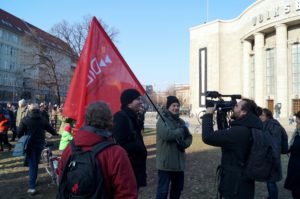
To blame is the often mentioned widening gap between the rich and the poor. It is macro structures like institutions, states and organisations with gigantic revenue on the one hand, and the many individuals on the other; “those above and us down here”. It is abstract.
Recently, Die Zeit dedicated an entire dossier to this trend. Democracy is in danger, was their message. “Earlier the German Parliament had many members that only [sic!] went through primary or secondary education. They were fabricants of tools, craftsmen, simple people.” Today this is not the case anymore, which is why increasingly these groups do no longer feel themselves represented. It is only logical that a political vacuum forms. Those most accountable for this development are the political parties. Who asks around about the upcoming federal parliamentary elections often encounters a general disorientation.
Party expenses for professional communications consultancy have multiplied over the last years. Any rigid distinction by content becomes increasingly difficult. Parties themselves have become parties of professional voters. True to the teachings of the market economy parties look for voters, like companies search for their clients. The alignment of political parties with topics that promise the biggest share of voters leads to the disregard of parts of society. Or, in the words of sociologist Didier Eribon, the neglect of entire social classes.
What our world is living at the moment is that this vacuum of representation is filled by parties and individuals, who preach a bizarre and one-dimensional world view. AfD, Front National, Geert Wilders, Donald Trump. It seems almost ironic that it is this year that Germany, France and the Netherlands hold federal elections. In those countries, in which unidimensional populists from the right have found their way into the middle of society. Their victory is a victory of “Irrationality” as an editor recently called it. The true meanings of “postfactual” or “Fake News” are visualized brightly and vividly this way.
The grave changes in the structure of society, the transition from industrial to service societies, urbanization and migration, they all pose a new social question, one that should be read focusing on city politics, as city councillor for housing in Berlin, Ephraim Gothe, contends. And the market will surely not solve it. For this reason alone, Gothe wants to convert city politics in a “real leftist project”, as the Tagesspiegel wrote. The Holm case spreads major distrust in this context. Actually, there is no reason to think about city politics without thinking of financial politics. And finance and speculation are running wild, as can be seen. Selling is fast, to take something into communal ownership is a long, embattled, legal process.

The political and social questions, big or small, are local. Globalized politics deciding over the heads of people is abundant, just not in the here and now of the population. In their housing and lives. If the Berlin government wants to reverse this trend it will have to listen to numerous initiatives in city politics and let them participate in decision making, also to pull the rug out under right wing populism. The government will have to foster direct participation and the integration of citizens and social movements into the political decision making process.
Already in mid-2016, the political scientist Wolfgang Merkel of Humboldt University warned that young leftists and students had lost their connection to the “lower class”, that they had oriented themselves in the direction of global elites. The student occupants of the institute of social science of Humboldt University have proven the contrary. Through the forum they provide to local initiatives and movements in city politics, for a “Stadt von Unten”, a city from below. They have made the first step towards a critical and local public that demands its right for participation.
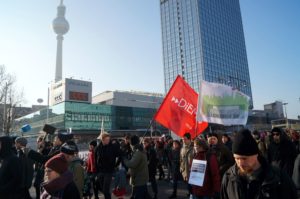
They are all present on this sunny Saturday in the heart of Berlin. United and loudly they demonstrate in front of the Rotes Rathaus, (the city hall), the Humboldt Forum, the city palace, the old city hall, the Volksbühne. “These people want their city back”, is what a participant comments. She participates for the movement “Democracy in Europe Movement”, short for DiEM. She relates that DiEM wants to connect the “rebel cities” of Europe. Her role model in this respect is Naples, the only major European city that brought its water supply back into public ownership. “This shows the need for change from below”.
Wandel von Unten, change from below, that is what the calls of the demonstrants demand among the historic buildings of Berlin.
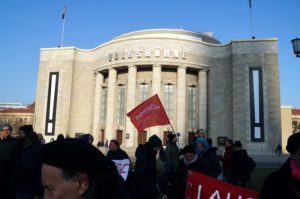
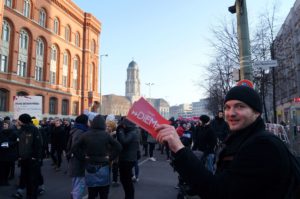

by Dominik Schlett, pictures by Reto Thumiger
Volete essere informati delle azioni di DiEM25? Registratevi qui!
